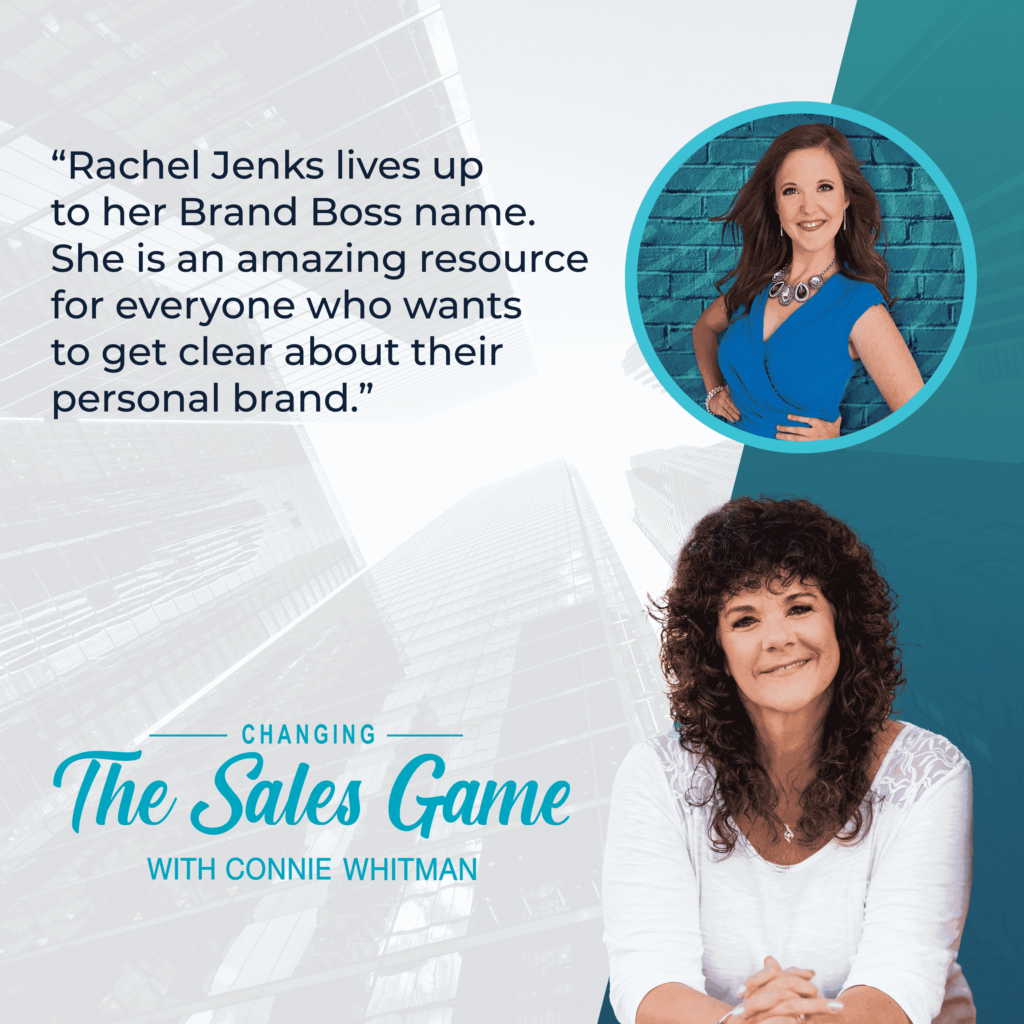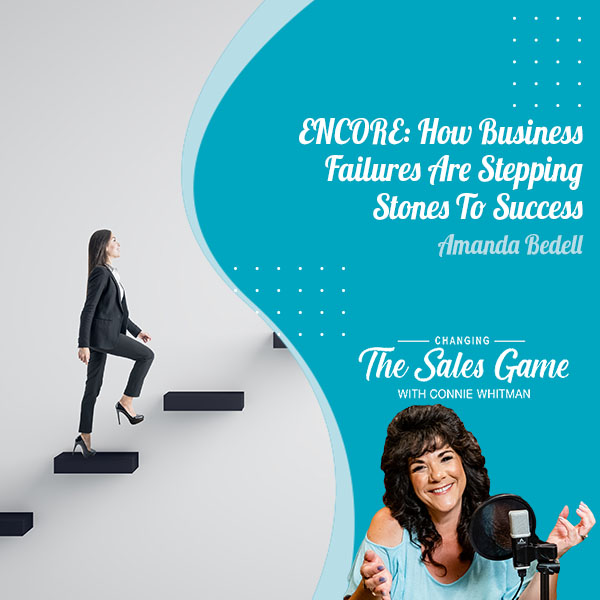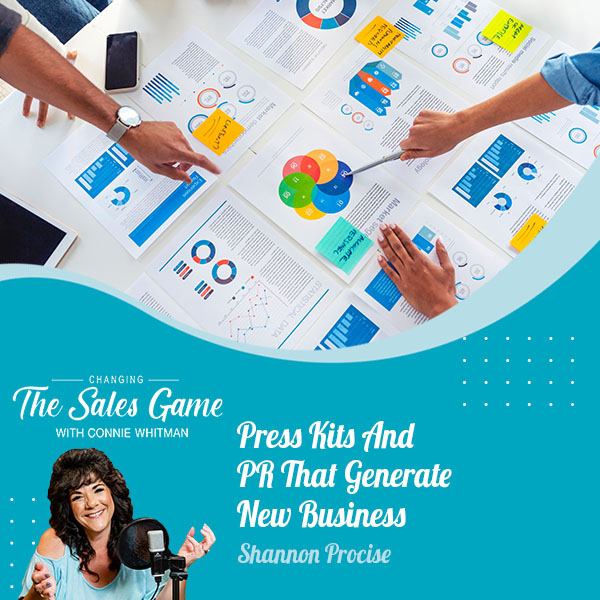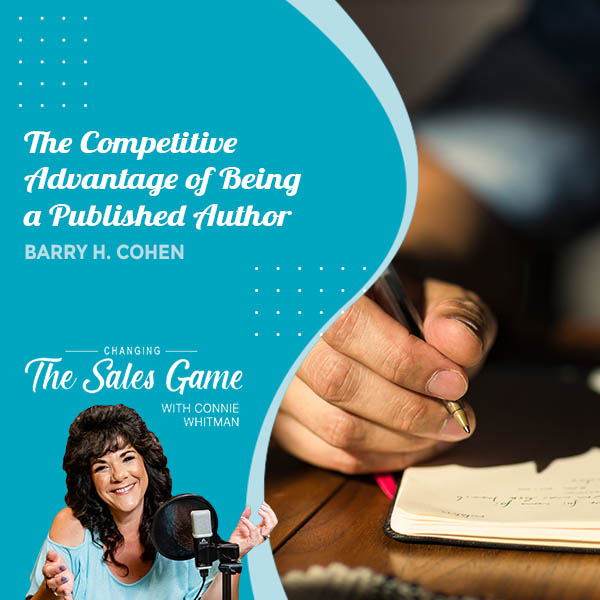If you don’t give the market the story to talk about, they’ll define your brand’s story for you.David Brier
Check Out These Highlights:
You have heard me say, “marketing and sales are two very different things.” For me and my business, I feel like since COVID, marketing and rising above the noise have gotten even harder.
Also, I keep hearing more and more about my personal and business brand and am always reading and learning so I understand what all these terms and strategies are all about so I can choose wisely and showcase who I am and how I serve my clients. It doesn’t seem to end!
When it comes to Marketing, there’s been so much emphasis on “keeping up,” and fitting in. But in a sea of noise and sameness, how can you truly stand out?
Personal Branding: The Power Of OWN-ing Your Difference With Rachel Jenks (EP. 101)
As always, I’m happy you’re here. I hope that as we go down this journey together of changing the sales game, you absolutely feel my passion. I’m creating a movement. We’re going to shift the word sales, so icky, sleazy, and manipulation don’t even come into our brains. When we hear the word sales, we know it’s about service, love, caring, and respectful exchange with whatever it is that you’re selling or whatever your business is that you’re offering. Join me on that mission and we can make that change together.
To help you on this journey and this mindset change of shifting the word sales, I have a free gift for you. I have a free Communication Style Assessment. At the core of everything we do, it’s about communication. Hopefully, with my assessment, you get two reports. One is spotlighting your superpowers and leaning into that piece because that’s how you naturally show up, and how people are receiving your messaging.
On the flip side, you will get a low score and a report for that lowest score, which is your blind spot. That’s for the people who maybe you don’t resonate with or they don’t resonate with you, but that doesn’t mean that you can’t do business together. That report shines a light on your blind spot and hopefully enlightens for you to have better conversations with everybody that you meet. Please take that free assessment. It’s my gift to you.
My motivational quote today is by David Brier. David says, “If you don’t give the market the story to talk about, they’ll define your brand story for you.” You’ve heard me say that marketing, sales, branding, and all of those are very different topics and very different skillsets. In my business, since COVID, I feel marketing and rising above all the noise that’s out there has gotten even harder, especially for business owners and I think for everybody.
Also, I keep hearing more and more about my personal brands and my business brands. I am always reading and learning so that I understand what all these terms and strategies are all about. As I move forward in my business or with my personal brands, I’m doing it thoughtfully, and I’m asking the right questions. The only way to do that is by learning about it. When it comes to marketing or branding, there has been so much emphasis on keeping up and fitting in. In the sea of noise and sameness, how can we truly stand out?
About Rachel Jenks:
Rachel, the Brand Boss, is going to share with us the power of OWN-ing Your Difference.
Rachel is the Brand Boss. With more than 23 years in Marketing and Communications, Rachel’s passion is empowering you to rock your brand like a Boss. Her off-the-beaten-path career journey has spanned multiple roles in various countries, four cities, and three states. And she’s had the opportunity to work with organizations of all sizes to amplify the power of their brands through brand strategy, consulting, and more. Rachel is also the host of The Brand Boss Show podcast and YouTube channel, a best-selling author, and an in-demand public speaker.
How to Get in Touch With Rachel Jenks:
I have an amazing guest today. Rachel Jenks is The Brand Boss. She’s going to share with us the power of owning your difference. Rachel is The Brand Boss with more than 23 years in marketing and communications. Rachel’s passion is empowering you to rock your brand like a boss. Her off the beaten path career journey has spanned multiple roles in various countries, four cities, and three states. She’s had the opportunity to work with organizations of all sizes to amplify the power of their brands through brand strategy, consulting, and so much more. Rachel is also the host of The Brand Boss Show Show and YouTube channel. She’s a bestseller author, an in-demand public speaker, and my friend. Please help me welcome Rachel to the show. Rachel, thanks for being on.
Thank you so much, Connie. It’s great to be here.
Branding Defined
Whenever we get on a Zoom call, I feel like we uncover so many things. We talk about so many important topics, and branding is critical. We are more visible than we’ve ever been because of social media and the internet, and all of the things that come along with that. I don’t think everybody is armed with what that actually means, and how they can control what they’re putting out there. There has been so much conversation about branding. First, let’s ground the conversation today. If you could define what branding is, then that sets the stage for our conversation.
To truly understand the power of branding, you have to understand what it is and what it isn’t. There’s still this school of thought that branding is like cattle branding. You’re putting your mark on something. That is not what branding is anymore. Everybody jumps to the logo, the colors, the visuals, and all that kind of stuff. That is just a fraction of the equation when it comes to your brand.
To truly understand the power of branding, we have to think about it in reverse. Branding is not about us putting our mark on something. Branding is the mark that every experience and every interaction with you on any level, any platform, in person, offline, or anything. Every single piece of that entire experience is branding. Every interaction that someone has with you is that opportunity to build or break trust because it’s making a mark on their minds.
When it comes to branding, you can’t think about putting your mark on something. It is the mark that that experience makes in the brains of your customers or potential customers. We talk about having a first impression with somebody. You could also have a 101st impression or 101,000 impressions. Every single interaction is an opportunity to build or break trust. When you understand that, that’s when you’ll be able to tap into the true power of branding.
Branding is not about us putting our mark on something. It is the mark that that experience makes in the brains of your customers or potential customers. Share on XIt’s interesting. I taught a class at a corporate client bank. My clients are predominantly banks. We were talking about branding, and how you, the individual, can affect the branding of the organization. They’re banks and they’re all in different branches within the footprint of the organization and the corporation. I said, “You don’t own the brand. The customer does.”
If I walk into one branch and I get this stellar experience, and then I go into another branch in your network and the same bank, I have a very different experience, and then a friend says to me, “Who do you bank with? I’m looking for another bank. I’m getting hit with fees” or whatever. They say, “My bank? This bank branch is really good. That’s not convenient for you. The bank branch that’s convenient for you don’t do such a great job.” That’s a brand. You’ve solidified that experience. It depends on where you go.
What I help corporations do is create a culture so that we’re playing by the same branding rules, if you will, not in a bad way, but that we can shine our light the same without becoming a Stepford wife. It’s still your personality and your demographic, wherever you’re located. That messaging has to be consistent so that I can easily say, “I got the best bank for you,” or “I got the best branding boss for you.” You have to earn that respect.
You said it. How many first impressions? There are many first impressions. Here’s the other thing. I don’t know, Rachel, if you know the statistics on this. If you have a good experience, you tell 3 people. If you have a bad experience, you tell 23 people. That branding becomes important, and the energy behind it that we put can become something very tangible.
Many people say, “We have this brand and we invested all this money in branding. Maybe they did on their website.” That’s great, but then somebody goes to the website and buys a product. Gets the product and the product falls apart. That’s branding. Maybe they need customer service and they can’t get ahold of anybody. They get dumped in the voicemail all the time. That’s branding. Maybe they go to your website and they can’t find out how to contact you. That’s branding. Maybe they see you in the grocery store and you hit them with your shopping cart. That’s pretty extreme.
On the flip side, if they see you interacting in the community and they have a wonderful experience with you, that’s also branding. Here’s why every single interaction matters so much. We have all been hurt by somebody who was not who we thought they were and somebody who didn’t follow through on what they said they were going to do or whatever. If you have an established relationship with that person, you’re more likely to give them another opportunity. The trust has to be rebuilt though. If you are just meeting somebody and you have a bad experience, you’re not going to give them another opportunity because you don’t have a proven track record with them over time that builds that trust.
When you think about branding, you have to think you are building your track record with that person. People do business with people, not only businesses. You are building that track record with that person over time. You established that level of trust because trust is earned. You have to earn that level of trust. We all have off days.

If you have an off day or something happens or whatever, and you make it right and you have an established relationship, you can lean into the power of that branding to help save that relationship because you have established that consistent relationship over time, whether it’s a friendship or a business relationship. If you haven’t and you have been sending mixed messages about who you are, and there have been these slight differences or it’s the first time, the odds of you salvaging that relationship are much lower.
It’s interesting. I had the exact experience that you’ve described. For our future listeners, we’re recording this in September of 2022. I’m speaking at the end of September 2022 at a Bank Trainers Conference. I was promoting it on my social media, on my email list, etc. I got this phone call on my voicemail, which no one ever calls me. Everybody does LinkedIn or messaging. What happened fifteen years ago was one of my clients in Connecticut is a bank. I had done work with them and did a great job or whatever. Fast forward, she has connected with me on LinkedIn. She saw my post and said, “Connie is still in business. It’s been 15 years later. We need business development training within the organization.“ They tasked her with it that week.
Talk about the universe working. She sees my post, “I’m excited to speak at this conference.” She left a voicemail message after she saw me. She could have easily messaged me on LinkedIn. She thought, “I want to talk to Connie.” She went and found the binder from the training. She got my old business card. Thank God my number is still the same fifteen years ago. She left a voicemail message and we ended up corresponding. We’ve already met, and now proposals are in the work and all of that.
It’s because I was trusted. She saw I was still in the business. They had a situation that week where the conversation was there. Who did she think of? Me. It was the timing of everything. My number is still the same. She knew what she was getting. We got on the phone. We caught up. It was like we never stopped talking. That’s the branding piece. She knows what to expect from me, even though we haven’t seen each other in fifteen years. It matters how we show up both in business and personal.
Business Brand Vs Personal Brand
That’s my next question, Rachel. What is the difference now between the business brands and the personal brands? For me, people know what they’re getting. I’ve rebranded to Changing the Sales Game because Whitman and Associates doesn’t mean anything to anybody. When you hear Changing the Sales Game, “Connie is all about sales. She’s going to get me off the bench and in the game.” That’s my business brand, but it’s who I am as well. Is there a difference? Can you explain that to us?
Absolutely. That’s such a beautiful example, even that story that you told of what we’re about to talk about. Connie, when you think about the people that you have met in the last 24 hours, probably some conversations are coming to mind, faces, names, and maybe emotions associated with that. When you think about the businesses that you’ve met in the last 24 hours, it doesn’t have the same emotional response. It doesn’t have the same experience. We don’t call those things to mind the same way. Why? Because humans are relational people. We relate to other humans, and people do business with people they trust.
I will never forget one of the first things that my business mentor taught me when I was launching my business six and a half years ago. It is that real business is H2H. It’s human to human. You have to remember the human in the equation. I know you’re passionate about that too. The real power of your personal brand is now you’re building know, like, and trust not just with what you do, but with who you are as a person. Recently, I was able to have the incredible honor of having The Go-Giver himself, Bob Burg on my show, The Brand Boss show. We talked about the Law of Authenticity, for any of you who are familiar with The Go-Giver.
Real business is H2H. It's human to human. Share on XI love this point that he brought up. Authenticity isn’t a value that you just slapped on your business. Give it the life that you live. The way that I say it is the most powerful marketing you will ever have is the life that you live. People see you. They see you in the community. They meet you through networking. They hear you on podcasts or speaking engagements or wherever you might be. They interact with you in the community. They interact with you in your business. They are not just doing business with a nameless and faceless business. They are doing business with people.
The more that you can tap into that and build know, like, and trust you as a person and not only your business, that is memorable and powerful. That takes your ability to build trust which accelerates it so much faster, and takes it so much deeper. That’s the difference when you think about branding your business. Branding your business still does matter. It doesn’t have the same level, particularly from an emotional connection of building know, like, and trust that your personal brand does.
One of the trends that I’m seeing right now is that people are burnt out. They’re burnt out. One of the things we’re burnt out of is marketing. Did you know that if you post on your business LinkedIn profile and share that, and then if you made that same post on your personal LinkedIn profile as if you were writing it, not just sharing from your business but you are posting that content, you will get 50% more engagement on that personal post than you will ever see from a business post?
Facebook has shadow-banned business pages. They’re honestly a joke right now. It’s all this stuff. Why? Because people are so oversaturated. There’s so much, “This business, this business, this business.” When you show up as who you are, people are paying attention because we are still relational humans. There’s still this hunger for human connection. That’s what you’re tapping into with your personal brand. That’s how it differentiates from your business brand. Does that make sense?
It does. It’s so funny the know, like, and trust factor. I remember when I first ran my digital workshop, I had done everything live pre-COVID. I took my signature program. I thought about how I can share this as free content to help people, and then maybe they’ll buy from me down the road. It’s sharing quality stuff. I did my first workshop. In the end, several people bought my program. The first thing I said is, “I’m so curious. I had never met you before.” I didn’t know these people. I’m like, “How did you find me that you ended up in this?” They sign up. It could be from my email. If it’s through one of my affiliates, then I know where they came from. These were people that just showed up from my email list. I was like, “How did you find me?”
They heard me speak during COVID. I was doing a lot of summits and giveaways and speaking events virtually, which I’ve never done before. They heard me speak at an event. I have two podcasts. I always share free resources wherever I speak. They started following me on my podcasts. Fast forward, I do this workshop and they thought, “I like Connie’s messages. I got to hear her workshop. It’s free. What do I get to lose? Let me jump on this call.” It’s 90 minutes, and then at the end, they bought.
This was the feedback I got, which was touching in so many ways because they didn’t know me. They never had a personal conversation with me, other than hearing me on the podcast and seeing me speak. They said, “Every time I listened to your show or every time or I read a post from you or you wrote an article, it’s like, ‘She’s talking to me.’” Now, they get in the workshop and I’m very engaging in my workshops. To hear me talk, “Boring.” I want engagement. That’s why I love hosting the show because we have these great conversations. We can learn so much more from those different voices of our expertise coming together.
In the end, they bought from me. They said it was because it was like I was talking to them for years and they trusted me. They then get on this workshop and they’re like, “You’re goofy as ever, but you give so much of yourself and your heart, and you share. If we didn’t buy from you, we would’ve learned still so much from the workshop. That’s who you are and that’s why we knew we had to buy from you because you’re going to over-deliver. I’m not worried about the investment. I know I’m going to get that back tenfold.”
They give me referrals from there. That’s the know, like, trust factor. It’s my business. I’m teaching them through my business, but they bought because of me. I want to use the word authentic because I think it’s overused. How you live your life, that’s where you’re authentic and you’re not. I don’t know how to be anybody but me. I don’t put on airs. If you like me, great. If you don’t, I know I’m not everybody’s cup of tea. I’m okay with that too. I have to be true to myself and be me. That’s why people buy from me because they know exactly what they’re going to get. They’re going to get this, with you and me having this conversation. They’re going to get all of me. That’s what you were saying if I understood that correctly.
That’s exactly what I’m saying. Even the example that you gave of that person from fifteen years ago, contacting you now. She didn’t say, “I need Whitman Associates.” She said, “I need Connie,” because she has a relationship with Connie. That goes to show it again. The story you shared is a perfect example of that as well. This goes back to trust coming before transactions. People do business with people they trust. When you are building that relationship with them, not only as a business or not some nameless and faceless business but as a person. That is so much more powerful and goes a long way in building trust. As you said, it’s all of you.
This is one of the things when it comes to authenticity. Authenticity isn’t something that you create. Authenticity isn’t something that you say, “I’m going to be authentic now.” Authentic is being who you are. At the end of the day, showing up authentically is being who you are. By the way, who you are will show through. “I see your true color shining through.” This is why I get so passionate about this conversation about personal branding because there’s so much noise. Can I get on a soapbox for a second?
Yes.
Authenticity isn't something that you create. It’s being who you are. Share on XThis is part of being me. There is so much noise out there about building this personal brand or positioning yourself as an expert, and so much of it is artificial. It is not real. It is not who that person actually is. They might come across as self-absorbed jerk, who is actually super nice. They think they have to show up this way. The flip side of that is true. It’s not about positioning yourself as anything. The reason that I don’t like that word is because of how it’s used. Is there value in positioning yourself correctly in the marketplace? 100%. The way that it is being used as a tagline is like you have to make yourself something. People see through that so fast.
There is literally brain science that backs this up. Each one of us has an identity center in our brains. That identity center is the same place where a goal center is sorted. If you are creating goals for yourself that you’re not following through on, they might not be in alignment with your identity. That was for free that I learned from a neurosurgeon and neuroscientist, Dr. Darlene Mayo, who I had the opportunity to have a conversation with on my podcast. It’s fascinating.
This is what I also learned from her. As humans with these identity centers, what happens over time is we have these experiences, and people say things to us, or we experience things or we think things or whatever that create these neural pathways that become this web over our identity center. It keeps us from operating out of who we truly are. Now, we’re showing up as we think we should, or as somebody else has told us who we are or whatever. It keeps us trapped from operating in our identity center.
The people whose identity center resonates with yours will still be drawn to you. It literally magnetizes them to you because their identity center resonates with your identity center. If you are not operating out of your true identity center, they’ll feel it. They’ll feel a disconnect. They won’t necessarily be able to articulate what’s happening, but something will feel off to them and it will actually repel from you the very people who are being drawn to you.
Here’s the flip side of this. When we show up in our true identity and in alignment with who we are, it actually starts to undo the neural pathways that have blocked our identity center as well. When we show up in the true identity of who we are and not positioning ourselves as anything or pretending to be anything or who we think we should have, could have, or would have. When you and I show up exactly as who we are, it literally has the power to jailbreak the minds of the people around us and the minds of the people we work with. How powerful is that?
Isn’t that crazy? I was listening, as you were speaking. Do you know what the reality is? It’s so much easier to be you than to posture and take on this persona that’s not you. There’s so much work in that. To me, that’s exhausting. It’s easier to be you.
I love that you used the word posture. That’s the word. No matter how much you posture yourself, somebody is going to have an interaction with the real you at some point. It’s not going to align with who they thought you were. At that moment, you broke their trust. Why would you intentionally have a marketing strategy that sets you up to break trust with people at some point? That doesn’t make any sense to me.
Yet, that’s what so many businesses don’t realize they’re doing. That’s what so many business owners are doing, not even intentionally. When you listen to this Pied Piper of posturing yourself and keeping up with all your competition like, “What are they doing? I have to be doing that too. I have to look like this, etc.,” instead of showing up who you are. If you listen to the Pied Piper, you are creating a strategy for yourself that is going to break trust at some point down the line because it’s not authentic to who you are.
If you listen to the Pied Piper, you are actually creating a strategy for yourself that at some point down the line is going to break trust because it's not authentic to who you really are. Share on XIt’s going to come through because you can’t put on a façade. That’s why people follow your podcast or they follow my podcast because you are who you are. I record two shows a week. That’s eight shows a month. It’s hard to put on with that many people, for that many different topics, and on that many different shows. It becomes quite exhausting.
Four Keys To Harnessing The Power Of Personal Brand
You’ve been doing this for so long, Rachel. What do you think are the most important components as they start to listen to this show? They think, “Who am I? What are my real values? What do people tell me that’s the most special about me?” After I meet with the client, what feedback do they give me like, “Thank you so much for being so concerned about me or for taking the time and being so patient,” whatever the words are. I start to analyze that within myself. What are the most important components though when I start to understand my personal brands, and then accentuate that to amplify that keys? That’s what people are going to resonate with.
There are four keys that I’m going to give you to really tap into and harness the power of your personal brand. I go a lot deeper into this in my personal branding coaching program. The first one is identity. The true foundation of every successful brand begins with identity. That’s personal brand or otherwise, but especially personal. When you know who you are, you can operate from that place. If you don’t know who you are, then you are sending mixed messages out into the world, and you probably don’t even realize it. The very first step is to be so clear about who you are. That goes far deeper than anything on the surface. If you were going to describe your husband to me, you’re not going to talk about what he is wearing unless he’s in a sharp onesie out on the deck or something. I don’t know.

Let’s hope not.
The way that we truly get to know people is so much deeper than anything on the surface, which is why you have to start with identity. When you are so clear on your identity, then you can say, “Does this messaging align with this identity and communicate this identity? Do these visuals align with and communicate? Does this customer experience align with this whole big picture of who you are? You have to start with identity. That’s the first key.
The second key is what is your sour spot? What are all of the ways that you have been showing up well-intentioned but perhaps misguided out of duty, out of obligation, and out of somebody else’s expectation? It’s all of these things. What are all of the components of who you are not? Let’s get clear on that because you have permission to not be that and not show up as that. When you know who you are, you can operate out of that place. When you know who you are not, you can operate in freedom, and not feel like you have to be all those things anymore.
Identity and sour spot. The next one is voice. What is your unique voice? There are facets to this like what is the tone and all of that. There’s also something deeper here. I know you know this, Connie. We’ve talked about this offline as well. Your unique voice carries a frequency that is specific to you. No one else on earth has the same frequency as your voice. When you are speaking out of your true voice, it literally releases a frequency to which the atmosphere responds. I know we’re getting a little bit into your other podcast with that, so I’ll leave that little note there. It’s powerful. There is a frequency and an energy that is released by your unique voice. What does it look like for you to show up as you are? What does it sound like?
That then ties into the fourth key. We’ve got identity, sour spot, voice, and the fourth key is authority. What is the unique authority that you bring to the table and that you bring to the people that you serve, which is based on your professional experience and also your personal experience? We all have authority in the things that we’ve walked through. You might think, “This happened over here, but that doesn’t tie into what I do in my business.” You would be surprised because all of this goes into this bigger picture of who you are as a personal brand.
One of the things that I love going deep into when I see so many a-ha moments for my clients is, “I didn’t realize that that impacts this.” Actually, that does allow me to show up a different way or I do have a different experience or I can work with these people in a different way because I’ve experienced it as well. All of these things. When you pair your unique voice with the unique authority that you bring to the table with your unique identity and knowing who you are not, that is a secret sauce that nobody else in the world has.
When you pair your unique voice with the unique authority that you bring to the table, that is a secret sauce that nobody else on the world has. Share on XThere is no one exactly like you. Every single fingerprint is different. Just like that, you are unique. That unique complete picture of who you are is going to organically set you apart from every other person, let alone every other business on the planet. There is a way that you can uniquely show up and serve. When you get so clear on that picture of your identity, sour spot, voice, and authority, now you can start to have the conversation of, “Now that I’m so clear about who I am, how can I make myself discoverable so the people who need me can discover me?” That’s a whole other conversation.
That’s right. That’s the marketing and sales. Branding and sales are different things, and they need each other. I want to share one more story, which I think is impactful. As people are listening, how do I figure out what my brand is or who I am? I may be very critical of myself. Here’s a story. This is what I recommend. Tap into what people are saying about you.
An example is one of my clients. I’ve known him for probably 15 or 18 years, or something like that. I’ve been in business for 21. He left one bank, went to another, and he’s running a division now. He’s one of the executives. He was there at this new bank for a week and he calls me. He says, “Listen, it’s budget season. I need numbers. I know what you can do. Here’s what I’m thinking.” We went through it and I said, “Give me the population, your table of organization, etc.”
We put the numbers together. He puts a tree. He goes, “We’ll figure out the topics and how we’re going to roll it out later. I just need numbers for budget. You got it, right?” We’ve worked together. Fast forward, I was able to do that in a day for him. Now, he comes to kick off the meetings, which I usually ask my executives to do so that it tells the employees, “This is the culture we’re building. This is very important.” It affects the branding and the word on the street of what the clients think of us and what we’re doing and why we’re doing it.
In the first meeting, he kicked off. I don’t know what they’re going to say. They’re going to introduce me and say, “This is what we’re doing. It’s what I’m thinking.” Remember, he was there for a week. He called me, “Give me numbers.” When he went to the CEO, the CEO said, “Aren’t you going to vet other people?” He goes, “Nope.” The CEO goes, “What are you talking about?” I didn’t know who the CEO was of this new organization.
This is what he shares at the beginning of the class. He says, “Let me tell you something. I’ve worked with vendors throughout my 30 years career in banking. They’ve all been very good.” This is what he ended up telling the class. He said to the CEO, “Connie is not only a vendor. Her curriculum is great like anybody else. She cares about the personal achievement of every one of you in this room.” He said to the CEO, “She cares about this bank. She cares about the employees. She cares about our bottom line. She’s all about the return on investment, and it’s personal to her. It’s not just business. That’s why I want Connie.”
As he was saying this, I was crying. I had never realized. I knew he liked me. I knew he respected me. I knew he trusted what I would do for him. Otherwise, he wouldn’t have called me in a week. When you hear someone else articulate and stands up for you to his CEO because he knew me, he knew what I would deliver, and he knew my heart that it mattered to me. It’s personal. It’s not just business for me.
I cried and he looked at me. He goes, “Why are you crying?” I go, “That’s the nicest introduction I’ve ever had in my life.” He looked at me and he goes, “I mean that from my heart.” I said, “I know that.” That’s why I am so touched by it. That’s your brand. When someone can articulate it with such clarity and passion and love. We’re in this corporate setting. There’s no relationship that’s weird in any way. We are professionals. We love each other as people. That’s your brand. That’s my brand. He saw that with such clarity. When in doubt, listen to how people introduce you or how they give you feedback. That’s where that branding is going to come from. I don’t know. That’s what I think, Rachel.

Your Identity Is Unique To You
I’m going to put a Yes-and. Yes, that’s part of it. I want to put a little caveat that nobody else defines your identity. Your identity is unique to you. One of the ways that we get into trouble in life is when we let other people define who we are. That’s why I want to put a yes-and. Here’s what I want to emphasize in that story. That is a powerful example of your personal brand shining through. He didn’t make you caring. That is your identity. You truly care. That is who you are. You demonstrated that and you gave him a proven experience consistent with that over time. That’s your personal brand. Not what he said who you are.
He saw who I am and was able to clearly articulate that because I am who I am.
It means your personal brand is shining through correctly. Be careful with that. That feedback on how you are perceived does matter as far as, “Am I communicating this clearly?” Don’t let that be what defines you. We get into trouble in life when we let somebody else’s opinion, expectation, or whatever define who we are. Nobody else gets to define who you are. That is you. That is unique to you. Your identity is unique to you. Everything he saw was the outflow of who you are. That’s why I want to tag that yes-and.
Nobody else gets to define who you are. Your identity is unique to you. Share on XThat makes sense. He saw it with clarity. You said it because I am consistently who I am and he knows that. Through the years, think about his employees alone that I’ve trained. It’s thousands. It’s that repetition, but it’s the great results over and over again. You can’t just go, “Look, I’m great.” You have to show up and be great over and over again. That’s the branding that we’re putting out there. That’s our personal brand.
Free Gift
Everyone, we’re out of time. My friend Rachel has a heart. She’s amazing. Go to BrandBossStudio.com. That’s her website. If you have a specific question for her, please reach out to her at Rachel@BrandBossStudio.com. We have a free gift. Can you talk briefly about what that is, Rachel, so they know?
I’d be happy to. My gift that I am excited to share with you is a free mini-course. It’s not very long. You can go through it in less than an hour. In that, I dig deeper into what we talked about here. These four keys and what you need to know. What is a personal brand? What matters? What do you need to have in mind? How do you own your difference? What does that even mean? All of those things, I go into in more detail in that course that I am delighted to share with you absolutely free to help you. Like you, Connie, my passion is to empower as many business owners and business leaders as I can to own your difference and rock it like a boss. I am very excited to be able to make this resource available to all of your community.
Thank you so much. That’s a helpful place for everybody to start if they’re interested or saying, “Is my brand on point?” This is a great place to start. Go through that mini-course. Thank you so much Rachel for sharing that. I do appreciate it. I love honoring and helping with real tangible things for my community, for them to move the needle on whatever it is that they’re working on in their business and their career, depending on where they are in perspective.
Additionally, for everyone, I have an All-star Community. I would love for you to come and play with me directly. You get me twice a month. The price point is super low. I would love to have you as part of my community, where you actually get me live. We talk and I can help you directly because I really do care.
Rachel, thank you again for an important discussion with clarity on how you went through how our personal brands affect our business brands and how they’re different. The personal is more feeling-intense, whereas the other one is more awareness-intense. My words, but that different vibrational energy between personal and business is an important distinction for us to understand what we’re creating. Thank you so much for that. I always appreciate your time and your thoughts on things because you do describe things with tremendous clarity for me. Thank you so much for that.
It’s my pleasure. Thank you so much for having me.
It’s really my pleasure. Thanks again for the great information. I hope you will join me weekly as we question, build, and discover together, no matter what challenges you’re facing, both personally and professionally, my guests and I, and the topics we discuss. I do hope that we provide some good ideas, tips, and strategies. As soon as you stop listening to the show, pick one thing and implement it. See what happens.
I know you guys are tired of hearing me say this, but information is a beautiful thing. If we do nothing with it, it’s simply information. Once we start to apply in our life and our business one little tip or one little strategy, the magic starts happening. Report back. Let me know how it goes. I am thrilled that you’re joining us every week. I am honored to have you on this journey of change with me. I truly hope we get you off the bench and in the game by changing your sales game and changing your life. Thanks so much for tuning in. I love you all. We’ll see you in the next episode. Have a great one.
Important Links
- https://www.BrandBossStudio.com/
- The Brand Boss Show Show
- YouTube -The Brand Boss Show
- Rachel@BrandBossStudio.com
- https://LinkTr.ee/conniewhitman
- https://www.ChangingTheSalesGame.com/communication-style-assessment
- https://ChangingTheSalesGame.MyKajabi.com/All-Star-Community
Stalk me online!
- Connie’s Website
- Connie’s LinkTr.ee
- Connie’s #1 International Bestseller Book – ESP (Easy Sales Process): 7-Step to Sales Success
- Download the FREE Communication Style Assessment
- Join our All-Star Community
Subscribe and listen to the Changing the Sales Game Podcast on your favorite podcast streaming service or YouTube. New episodes are posted every week on Web Talk Radio. Listen to Connie dive into new sales and business topics or problems you may have in your business.

 Rachel, the Brand Boss, is going to share with us the power of OWN-ing Your Difference.
Rachel, the Brand Boss, is going to share with us the power of OWN-ing Your Difference.


